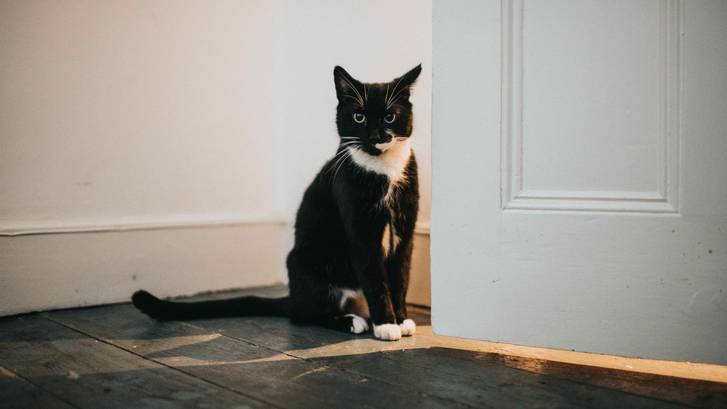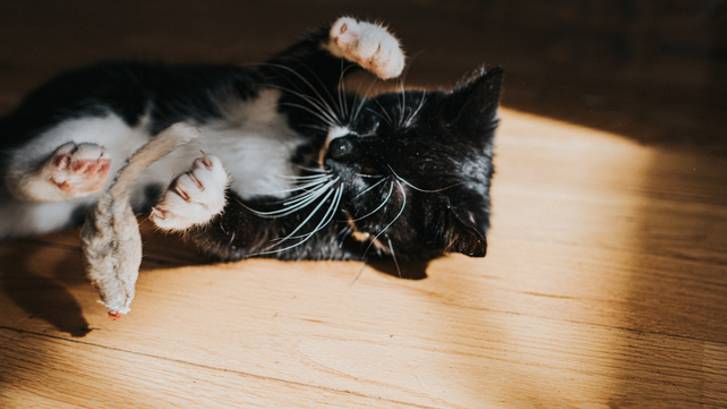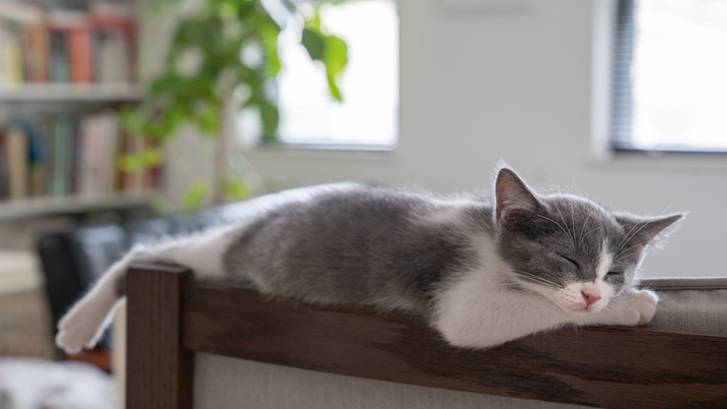Are cats nocturnal? How to get a cat to sleep at night
We all love our cats, but not when they won’t let us sleep! If you’re wondering how to get a cat to sleep at night, read on

Frequently woken up by 4am zoomies? Then it's likely you're wondering whether your cat is nocturnal and it's normal behavior or your feline friend is deliberately ensuring you go without a wink of sleep.
When you're sinking down into a well-deserved slumber, and your cat decides that 11pm is the perfect time to play hide-and-go-seek with the bedroom drapes, then it's completely understandable to find yourself frantically punching 'how to get a cat to sleep at night' into a search engine, particularly if your cat gets aggressive in the twilight hours and decides to paws at the covers too.
If you’re looking to calm your cat come bedtime, this article will help you understand your feline's sleep patterns and provide ways you can encourage them to let you sleep at night.
For new additions to the household, be sure to also read our guide to how to get a kitten to sleep at night for additional tips and tricks.
- Best cat bed: Cozy cribs for your feline
- 6 cat sleep positions: What they tell you about your kitty
- Best cat hammocks: Let your feline hang out in style
Are cats nocturnal or crepuscular?
The good news is that, unlike badgers and hamsters, cats are not nocturnal. The bad news is that they are crepuscular – which means that they’re most active at dusk and dawn. That’s not too bad in the winter and fall, but in spring and summer when ‘dawn’ means around 4am, it could be a little wearing – particularly if your cat won't stop meowing!
Many animals who evolved in a desert environment, such as cats, are crepuscular to take advantage of the coolest parts of the day. This includes prey animals such as rabbits – so there’s the added benefit to cats that dawn and dusk are the likeliest hunting times.
Take a look at your kitty’s eyes, and you’ll see a vertical, slit-shaped retina. This is common to all nocturnal and some crepuscular creatures, as it lets in the maximum amount of light in a darkened atmosphere. Human retinas are sphere-shaped and as a result we see much better in the light than the dark – as you’ll know if you’ve tried to cross a darkened room to find where your cats are!
Animals with eyes with vertical slits are likely to be ‘ambush predators’. This is a type of hunting behavior in cats which involves finding a likely spot that’s frequented by prey, sitting and waiting and then pouncing. That’s why you’ll often find a playful kitty jumping on your bare toes in the early hours of the morning.

Understanding cat sleep patterns
If you’re being driven to distraction by disturbed nights, it’s logical to think your cat’s behavior has been driven by her sleeping all day and having too much energy during the night.
In reality though, this probably isn’t the whole story as the sleeping patterns of cats differ from our own. We tend to get one, solid, uninterrupted block of sleep to carry us through the next 16 hours (if we’re lucky!).
Cats – for whom the term ‘cat nap’ was invented – tend to get short sleeps alternated with brief but intense bursts of activity. So while you’re slaving away at your office trying to make some money for cat food, kitty is alternately stalking her toys and resting from her labors.
Even when cats are sleeping, they have one eye open and every sense on the alert for danger – or the sound of the treat tin opening. This is a trait that’s evolved to stop predators creeping up undetected.
Veterinarian Dr. Cathy Lund from the American Association of Feline Practitioners says: "Carnivores are hard-wired to sleep much more than prey species, and cats are unique in their ability to move from deep sleep to wakefulness without any of that grogginess so familiar to us humans."
How much sleep does a cat need?
So, how much sleep is normal for cats? Our feline friends need from 13 to 20 hours sleep a day, depending on age, which they get it in a long series of cat naps throughout the day.
On average, it's 15 hours per day. However, there is significant individual variation in sleep habits. Some active cats may sleep as little as 12 hours per day, while some may sleep up to 20 hours per day.

Where should cats sleep at night?
This is a question that the veterinary world can’t seem to agree on! Sleeping with your cat has undoubted benefits for both of you, but if you have a particularly restive kitty or you’re a very light sleeper, it may be best to sleep alone. It’s normally fine to shut your pet in a different room, but it needs to be prepared so that they think of it as theirs.
Construct a cozy den, provide fresh water and a litter tray and accustom your cat to their new bedroom before you shut them in.
How to get a cat to sleep at night
Understanding your cat’s behavior might be one thing, but if you still can’t sleep yourself then you’re unlikely to remain sympathetic for long! Fortunately, cats have become adept at domestication and evolving their behavior pattern to mimic ours. This means that it can be possible to get your cat into a routine that fits in better with your lifestyle.
As we’ve seen, cats are hard-wired to be more likely to be lively at certain times of day but other factors could also be affecting behavior.
1. Keep them busy in the evening
One major factor with domestic cats – particularly single cats who don’t have the option of going outside – is boredom. When you get home, your cat could be keen for attention and unwilling to let you drift off to sleep, even becoming aggressive.
Try to schedule some interactive play time every evening. Keep your cat awake and engaged, and she’ll have less energy overnight. If she does wake you up overnight, don’t reward her with play or you’ll create an expectation.
2. Change their feeding times
As wild cats are programmed to hunt at dawn, your own cat may feel a little hollow in the early hours. Cats tend to fall asleep after eating, so you may find that moving supper to a much later slot helps.
Alternatively, you could use an automatic feeder and set it for dawn. Don’t give any food overnight, though, as cats are pretty bright and will soon learn not to sleep at all until they’ve demolished their tasty treats!
3. Consult with your veterinarian
It’s possible that there could also be a physical cause for your cat’s behavior. For example, kidney problems can cause a cat to drink excessively and cry for attention when they’re thirsty. If the nocturnal prowling is a new problem or a change in established behavior, then it’s best to speak to your veterinarian.
What can I give my cat to sleep at night?
Settling your cat into a bedtime routine is the best way to aid sleep – for both of you. Give an interactive play period just before bedtime, followed by a small meal. Your veterinarian can also advice on natural sleep supplements and also mild sedatives, which may help to calm your cat to get her back on schedule.
Not being able to sleep can be really punishing, but it’s important to remember that your cat really isn’t keeping you up on purpose! Stress will exacerbate any situation, so if can’t get your cat to sleep at night then try shutting her into another room, following our tips above. Once she learns that she isn’t able to get any attention during the night, it’s likely that she’ll stop trying and will let you sleep in peace.
You might also want to read: Why does my cat sleep between my legs?
PetsRadar Newsletter
Get the best advice, tips and top tech for your beloved Pets
Sara is a freelance journalist and copywriter of many years’ experience with a lifelong love of animals. She’s written for a range of magazines and websites on subjects varying from pet care to travel. A horse rider since the age of five, she’s currently a full time pet slave to horse Blue and gorgeous, goofy English Springer Spaniel Olly. Adorable Olly has a huge sense of adventure and no sense of direction, keeping Sara on her toes.

